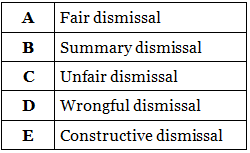Sentence Completion: Practice Test - 5 | Reading for General Training IELTS PDF Download
Workplace Dismissals
Before the dismissal
If an employer wants to dismiss an employee, there is a process to be followed.
Instances of minor misconduct and poor performance must first be addressed through some preliminary steps.
Firstly, you should be given an improvement note. This will explain the problem, outline any necessary changes and offer some assistance in correcting the situation. Then, if your employer does not think your performance has improved, you may be given a written warning. The last step is called a final written warning which will inform you that you will be dismissed unless there are improvements in performance. If there is no improvement, your employer can begin the dismissal procedure.
The dismissal procedure begins with a letter from the employer setting out the charges made against the employee. The employee will be invited to a meeting to discuss these accusations. If the employee denies the charges, he is given the opportunity to appear at a formal appeal hearing in front of a different manager. After this, a decision is made as to whether the employee will be let go or not.
Dismissals
Of the various types of dismissal, a fair dismissal is the best kind if an employer wants an employee out of the workplace. A fair dismissal is legally and contractually strong and it means all the necessary procedures have been correctly followed. In cases where an employee’s misconduct has been very serious, however, an employer may not have to follow all of these procedures. If the employer can prove that the employee’s behavior was illegal, dangerous or severely wrong, the employee can be dismissed immediately: a procedure known as summary dismissal.
Sometimes a dismissal is not considered to have taken place fairly. One of these types is wrongful dismissal and involves a breach of contract by the employer. This could involve dismissing an employee without notice or without following proper disciplinary and dismissal procedures. Another type, unfair dismissal, is when an employee is sacked without good cause.
There is another kind of dismissal, known as constructive dismissal, which is slightly peculiar because the employee is not actually openly dismissed by the employer. In this case, the employee is forced into resigning by an employer who tries to make significant changes to the original contract. This could mean an employee might have to work night shifts after originally signing on for day work, or he could be made to work in dangerous conditions.
Questions 1 and 2: Complete the sentences below. Choose NO MORE THAN THREE WORDS from the text for each answer.
Q.1. If an employee receives a ______ , this means he will lose his job if his work does not get better.
Q.2. If an employee does not accept the reasons for his dismissal, a ______ can be arranged.
Questions 3–7: Look at the following descriptions and the list of terms in the box below. Match each description with the correct term A–E. Q. 3. An employee is asked to leave work straight away because he has done something really bad.
Q. 3. An employee is asked to leave work straight away because he has done something really bad.
Q.4. An employee is pressured to leave his job unless he accepts conditions that are very different from those agreed to in the beginning.
Q.5. An employer gets rid of an employee without keeping to conditions in the contract.
Q.6. The reason for an employee’s dismissal is not considered good enough.
Q.7. The reasons for an employee’s dismissal are acceptable by law and the terms of the employment contract.
Solution of 1:
If an employee receives a (final written warning), this means he will lose his job if his work does not get better.
Solution of 2:
If an employee does not accept the reasons for his dismissal, a (formal appeal hearing) can be arranged.
Solution of 3:
An employee is asked to leave work straight away because he has done something really bad. - (B)
Solution of 4:
An employee is pressured to leave his job unless he accepts conditions that are very different from those agreed to in the beginning. - (E)
Solution of 5:
An employer gets rid of an employee without keeping to conditions in the contract. - (D)
Solution of 6:
The reason for an employee’s dismissal is not considered good enough. - (C)
Solution of 7:
The reasons for an employee’s dismissal are acceptable by law and the terms of the employment contract. - (A)
|
25 videos|60 docs
|















